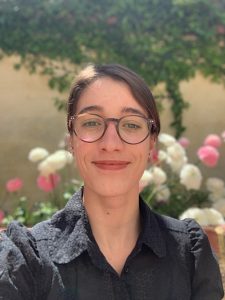2023-24 Sustainability Graduate Fellow Maddie Hunter
 Madeline (Maddie) Hunter
Madeline (Maddie) Hunter
Degree Program: Masters in Plant, Soil, and Environmental Science
Advisors: Ellen Mallory
What problem/s are you working to solve?
My Master’s project is concerned with identifying best practices for nitrogen management in organic no-till dry bean production. Nitrogen management is a major constraint for organic dry bean farming. My goal is to try and come up with alternative best practices that are cost efficient and maintain/enhance soil health at the same time, and that farmers can easily implement on their own farms. Basically, as researchers, we do the experiments, so farmers don’t have to take on those risks.
What progress are you making toward solutions?
I have only just started my studies here at UMaine, but my team has had success in similar research projects aimed at increasing the sustainability of no-till organic soybean production in the Northeast United States. I will be drawing off these insights for my future work on dry bean systems.
How could your findings contribute to a sustainable future in Maine and beyond?
Success in this field could have major social, economic, and environmental impacts. Evaluating best nitrogen management practices for organic dry bean farming will relieve a major inhibitor to successful utilization of this crop in organic farming rotations. This will provide an economic benefit, as dry bean has higher profit potential than comparable crops such as soybean. The adoption of no-till production in this system will also help regenerate soil health, reducing the effects of extreme weather on production and improving yield stability. The exciting part about this project is that it isn’t just isolated to the state of Maine, universities in Vermont, New York, and Wisconsin will also be contributing data. Therefore, our results will have significance for organic farmers from across the Northeast and Upper Midwestern United States.
Why did you get involved with the Mitchell Center Sustainability Graduate Fellowship Program?
I have been passionate about learning about sustainability since my undergraduate studies in environmental science. However, I found that my environmental science background was often insufficient in explaining the full complexities of sustainability issues, with its interaction of social, economic, and environmental spheres. I was drawn to the Mitchell Center Sustainability Graduate Fellowship Program by the promise of connecting with like-minded individuals from a variety of different academic backgrounds, as I saw this as a fantastic way of determining where my knowledge gaps lay and challenging my current perceptions of the concept of sustainability.
What sustains you?
Getting outdoors. I think I picked a pretty brilliant place to live in this respect!
Where do you hope to be in five years?
In five years, I’m hoping I’d have finished my Master’s! My goal would be to be working as an agronomist (a specialist in crop and soil health who can help farmers in the management of their cropping systems), developing more sustainable cropping systems in collaboration with smallholder farmers.
What’s your ultimate Maine experience?
My ultimate Maine experience was going on a camping trip to the beautiful Deboullie Public Lands on my second week of being in the state. It was September, the first leaves of Autumn were just starting to turn, there was a thick layer of technicolored mushrooms layering the forest floor, and the lake water was perfectly flat and serene. It was magical. Although, I didn’t see a moose, which I suppose would have truly made it the ultimate Maine experience.
